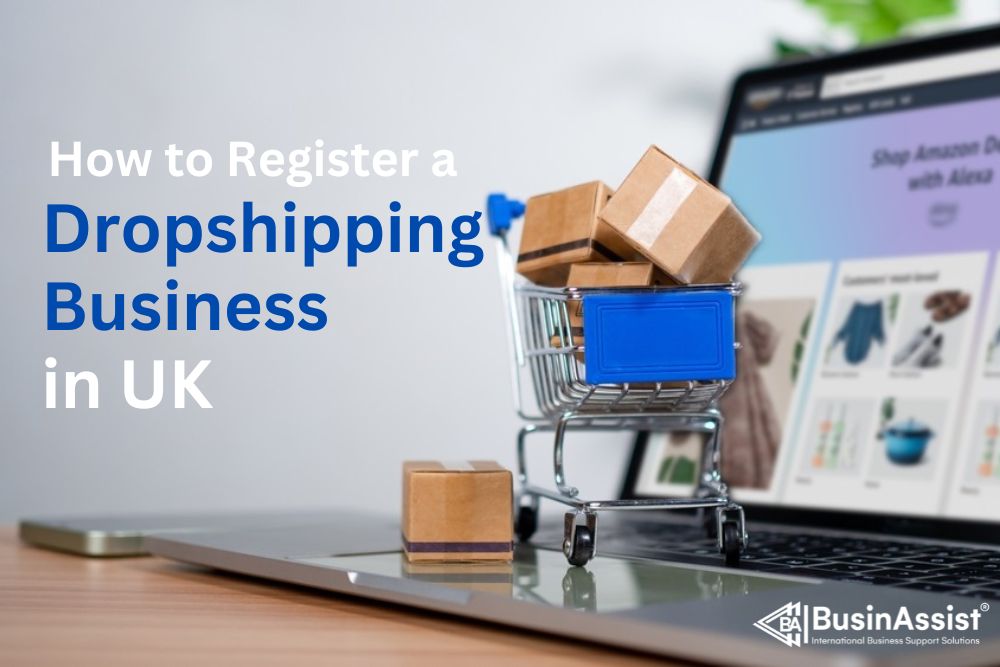Last Updated on December 18, 2025 by Joy Kyalo

Entrepreneurs have embraced dropshipping a new way of doing business. Dropshipping is a low-cost business model that can be operated online.
With a dropshipping business, all you need is to set up a website, find a supplier or manufacturer, and start selling. Amazon and Shopify heavily rely on dropshipping. They offer an online platform where sellers can market and sell their products.
Starting a dropshipping business in the UK, there are several legal considerations you should be aware of to easily navigate.
In this article, we will explore how to register a dropshipping business in UK and the legal considerations you should consider to operate smoothly.
What is dropshipping?
Dropshipping is a business model where you, as a retailer, sell the product but a third party fulfills the order. When a customer makes an order, it is received by you, the retailer, and is sent to a third-party company or wholesaler who will fulfill the order and send/ ship the goods to the customer.
You profit from the difference between the wholesale price and the retail price without handling the physical goods. It’s a low-risk way to start an online store since you don’t need to invest in inventory upfront.
How does a dropshipping business work?
In dropshipping, when a customer places an order, the store forwards it to a dropshipping supplier. Here’s how it works.
- Customer order: A customer orders a product or service from your online store.
- Forward order: You forward the order to your supplier or wholesalers.
- Fulfillment of the order: The supplier stores the inventory, packs the product, and ships it directly to the customer.
- Customer delivery: The customer receives the product without you handling inventory or shipping logistics.
How to start a dropshipping business?
- Decide on the business model: Consider if dropshipping is the right model for you. It allows you to sell products without holding inventory, but competition can be tough.
Choose a niche based on your knowledge or market demand. Research keywords and find underserved niches. - Find a supplier: Look for suppliers who ship to the UK. Compare pricing, features, and customer service.
Consider UK-specific factors like product demand and popular payment methods. - Select products and set prices: Create a product catalogue and set competitive prices. When setting product prices, allow a reasonable profit margin while remaining attractive to customers.
- Create your store: Set up an e-commerce store on a platform like Shopify, eBay, WooCommerce, Amazon, TikTok, Magento, etc. and optimise your store for profitability.
- Business structure and finances: Choose a business structure (e.g., LTD company). Incorporate your UK limited company with Companies House. Open a business bank account and set up payment gateways to process transactions securely.
- Market your business: Use online marketing to attract visitors. Target ads for UK customers. Use digital marketing such as social media, content marketing, email campaigns, and influencer collaborations to attract customers.
What are the advantages of dropshipping?
- Low startup costs: You don’t need a large capital to start a dropshipping business reducing initial expenses compared to traditional retail.
A dropshipper is not responsible for inventory, warehousing, labour costs, picking, packing, and shipping reducing operating costs. - No inventory management: Retailers do not handle inventory since they do not stock or handle products avoiding storage costs and the hassle of managing stock.
- Wide product range: You are free to offer a wide range of products without physically stocking them.
- Flexibility: The dropshipping business offers flexibility since it can be handled and managed from anywhere with an internet connection.
- Scalability: As your business grows, you can add more products without worrying about storage space.
- Reduced risk: If a product doesn’t sell well, you’re not stuck with excess inventory.
- Easy market entry: The low barriers to entry make dropshipping an attractive option for new entrepreneurs.
What are the drawbacks of the dropshipping business?
High competition:
Due to the low cost when starting a dropshipping business, the competition is high and intense leading to reduced profit margins.
Lack of control:
A dropshipper has limited control over the products and services. Since they heavily rely on suppliers, they will have limited control over inventory management, shipping times, and product quality.
Low-profit margins:
Due to high competition, there will be competitive pricing that will lead to small profit margins. Balancing costs and revenue can be challenging.
Returns and customer service:
Handling returns due to poor quality, expiry, or spoilt can be difficult since you have no control over the products. Since the customer ordered from you and you are the first contact, you’re responsible for addressing customer inquiries and resolving issues.
Little pricing control:
You can’t set your own prices since they are determined by suppliers. This lack of control can impact your profitability.
Quality control:
Since you don’t handle the products directly, ensuring consistent quality can be a challenge. When customers complain about the quality of the products or services, you will be the one to handle the complaint.
Despite the drawbacks, dropshipping can still be worthwhile if you’re willing to put in the effort to establish a solid online store and focus on effective marketing strategies. You can easily register a UK limited company formation and start your dropshipping business.
How to register your dropshipping business with BusinAssist
How to Register a Dropshipping Business in UK: BusinAssist can help you register your dropshipping business. With our UK company formation services, we can advise on the best company structure that suits your business and help you set up your business.
Even when you are located overseas and want to start a dropshipping business in the UK, we’ve got you covered. We have a London virtual office service that offers addresses to register your business. We have a variety of prestigious addresses you can choose from at an affordable rate.
We have also partnered with banks such as Tide where you can get up to £70 cash back once you open a business bank account. With our banking partners in the UK, you can open a UK business bank account without a physical meeting for UK or non-UK residents.
We also provide a variety of other services such as VAT registration, EORI Number Application Service, UK Virtual Mobile Number service, USA Virtual Mobile Number service, UK VoIP Landline Service, and much more.
To register your business with BusinAssist, simply follow these steps:
Choose a name for your company:
Choose a company name that will state what your company is going to be doing to give customers a clear understanding of the products or services you are providing.
Once you settle for a name, check if your selected company name is available or not. You can check it through the company name availability checker at the Companies House website.
Select directors and shareholders and allocate company shares:
You must decide on the directors, shareholders, and Persons with Significant Control (PSC), who will legally make up the company.
A director can be a corporate body; however, your company must at least have one human director.
To qualify to be a director, one has to be at least 16 years old, not have undischarged bankruptcy, and not have been disqualified as a company director.
A company must have at least one shareholder, but it can be the same person as the director. PSC is someone who controls or owns your company. A company can have just one PSC or several. A PSC must meet one or more conditions known as the ‘nature of control’.
Finally, decide on their associated shares. By choosing how ordinary shares are divided, you are also stating which key people are entitled to which proportion of company dividend payouts.
Complete the Memorandum and Articles of Association:
After shares allocation, you will complete the memorandum and article of association. Memorandum of Association outlines the formal process of setting up the company, how it will be run, owned, and managed as well as the responsibilities and powers of the company’s named directors.
Before company registration, the documents will need to be agreed on and signed by the company director(s), shareholder(s), and secretary.
Though it can be written in a relatively simplistic manner, it is worth consulting with an expert as the document can have great significance in the event of future disputes on tax and legal compliance.
For a fee of £0.99 and an additional Companies House fee of £50, BusinAssist can have your business ready to trade and company documents processed within one day.
Choose a package:
Choose a package of your choice on our website at: https://businassist.com/uk-virtual-office-business-address.php.
To get started, you will enter your company information on our quick application form and we will help you with the rest.
BusinAssist can complete UK company registration with Companies House within 1 working day, however, Companies House may take 1 to 2 working days to process the application.
After the application is approved, we will send all UK ltd company formation documents to you via email.
For more information, contact us at info@businassist.com.
FAQs:
Q: Is dropshipping legal in the UK?
Ans: Yes, dropshipping business is legal in the UK. However, there are essential restrictions to follow such as ensuring the products you sell comply with UK consumer laws.
Q: Does dropshipping still work in 2024?
Ans: Yes, dropshipping still works in 2024. It is an excellent time to start a dropshipping business since there are high demands which need to be met regardless of the crowded and competition concerns.
Q: Is dropshipping profitable?
Ans: Yes, dropshipping is profitable. However, it depends on your product selection, marketing strategies and customer service. To have a profitable dropshipping business, you will have to put in more effort and have a well thought of strategy.
Read Also:
- How Much Do Amazon Sellers Make in the UK? An In-Depth Analysis
- How to Find Trending Products on E-commerce Marketplaces: A Guide for Online Sellers
- The Hidden Costs of Being VAT Registered: Is It Killing Your Business?
- How to Start a UK Ltd Company from Pakistan: Step-by-Step Guide
- Do I Need a Registered Business to Sell on Etsy? A Simple Guide for Beginners
- Do I Need a Registered Company to Sell on Amazon? A Guide for New Sellers
- Is it worth selling on TikTok for your small business?
- Best eCommerce Platforms for Small Businesses in the UK
- How to Start Selling Products Online from Home: A Beginner’s Guide

The BusinAssist Editorial Team has 15+ years of experience writing about small business and company formation in the UK, Canada, and the USA. We simplify complex processes and provide practical insights to help entrepreneurs succeed. Business Assist with BusinAssist – your partner for business success.

